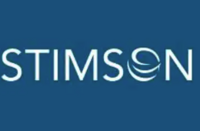Nonprofit, nonpartisan institution focused on international peace and security
The Stimson Center is a nonprofit and nonpartisan think tank that seeks pragmatic solutions for some of the most important peace and security challenges around the world. Stimson's analysts, who travel the globe for their research, make the Center a trusted source of expert knowledge, fresh perspectives, policy prescriptions and creative ideas. Through rigorous in-depth analysis driven by facts rather than ideology, Stimson focuses on: Strengthening institutions for international peace and security. Building regional security. Reducing weapons of mass destruction and transnational threats. By engaging policymakers, policy implementers and nongovernmental institutions as well as other experts, Stimson is able to craft recommendations that cut across political party lines and are actionable and effective. Founded in 1989 by Barry Blechman and Michael Krepon, who are now distinguished fellows at the Center, Stimson is currently led by Chairman of the Board Lincoln Bloomfield, Jr. and President and CEO Ellen Laipson. Bloomfield has held foreign policy and national security positions at the Defense Department, State Department and White House. Laipson joined Stimson in 2002 after federal service at the National Intelligence Council, U.S. mission to the U.N., National Security Council, State Department and Congressional Research Service. The Center has been honored as one of the top think tanks in the world and received the prestigious MacArthur Award for Creative and Effective Institutions in 2013. Stimson serves as a source of expertise for all sectors of the policymaking community - the U.S. executive and legislative branches, international institutions and governments, and policy research institutions - as well as the media, academia and the general public. The Center is named after former U.S. Secretary of War and Secretary of State Henry L. Stimson, who served under Presidents William Howard Taft, Herbert Hoover, Franklin Delano Roosevelt and Harry Truman. Henry L. Stimson believed in "pragmatic idealism" - the notion that progress toward peace is only possible through practical steps and strong U.S. engagement in the world. Stimson has a 24-year track record of meaningful work on key international security issues. Past projects have covered a wide range of topic areas, from eliminating weapons of mass destruction, to the roles and missions of the U.S. armed forces, to confidence-building measures for the Korean Peninsula. The Stimson Center is funded by research contracts, grants from foundations and other donations.
